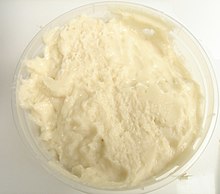Surimi
Surimi ( Japanese す り 身 , "ground meat") is a solid mass of crushed fish . About 900 years ago it was discovered in Japan that chopped fish, cooked with sugar and jellied , became more durable. The word originally refers to this manufacturing process; In Europe, surimi is usually understood to mean imitation crab meat made from it .
Manufacture and use
Surimi has played a role in the food industry since 1959. The fresh fish caught is no longer prepared directly at sea, but rather frozen raw with humectants such as polydextrose , sorbitol and polyphosphates and later processed. Today fish species that are not directly marketable ( lean fish ) and krill are used as raw materials.
The mass, freed from skin, bones and shells, crushed and washed several times and therefore almost tasteless, is solidified with, for example, chicken protein , starch , oil , sugar , salt , flavor enhancer and sorbitol with the aid of heat and, depending on the intended use, flavored and colored . If the product is offered as a surimi, it is enriched with a cancerous aroma and colored red-orange or pink on the outside with paprika extract or coloring agent. The shape is mostly oblong and as thick as a finger; it is suitable as a filling for maki sushi . As an imitation for crabs and prawns , surimi is prepared in a similar way, but shaped differently and is part of many ready-made dishes that contain “seafood”. Mixed with squid remains and algae extracts, shaped into rings and breaded , surimi is offered as a substitute for squid. With a different flavor, it can also be used for meat products such as sausages.
A traditional Japanese form of surimi is called kamaboko .
Declaration obligation
In Germany, in order to avoid confusion, the presence of surimi must already be included in the product declaration (for example "seafood mix with surimi"); it is not sufficient to simply state it in the list of ingredients. The Hamburg Federal Research Center for Fisheries found undeclared surimi in seven out of ten shrimp meat samples in 1994.
The administrative court of Baden-Württemberg ruled in a judgment of February 11, 2010 (Az. 9 S 1130/08) that a surimi proportion of 20% must be mentioned in the sales description of a seafood mixture.
Individual evidence
- ↑ "Surimi" may not be sold as seafood. Administrative Court of Baden-Württemberg, February 11, 2010.
Web links
- OSU Seafoodlab The Monsanto- sponsored research center at Oregon State University

